June 2012 ISSN 2070-4593 - NGC
June 2012 ISSN 2070-4593 - NGC
June 2012 ISSN 2070-4593 - NGC
Create successful ePaper yourself
Turn your PDF publications into a flip-book with our unique Google optimized e-Paper software.
“In this regard, we strongly urge the international community, particularly developed<br />
countries, to ensure the provision of financial resources, technology transfer and capacity<br />
building to SIDS,”<br />
The two-day conference in May brought together more than 100 heads of state, ministers,<br />
leading development experts, civil society activists, business executives and UN officials<br />
from 39 countries from the Caribbean, the Pacific, Indian Ocean, and Africa, that belong to<br />
the SIDS group.<br />
“Our global presence, expertise in capacity building, and extensive<br />
development finance experience allow us to help small island<br />
development states in their transformation toward sustainable<br />
energy for all, by supporting them to develop capacities to attract<br />
investments,” said Michelle Gyles-McDonnough, UN Resident<br />
Coordinator and UNDP Resident Representative for Barbados and<br />
the Organisation of Eastern Caribbean States.<br />
The Declaration reiterates “that the<br />
outcomes of the Rio+20 Conference must be<br />
ambitious and convey the urgency of fully<br />
embracing the sustainable development<br />
agenda including the fulfillment of all<br />
commitments related to SIDS.”<br />
If small island states switch to renewable<br />
energy, they can free up to 30 percent of<br />
gross domestic product for investments into<br />
jobs, health care, education, adaptation to<br />
rising sea levels or other programs.<br />
Small island developing states are among<br />
the most petroleum dependent countries<br />
in the world. Oil typically accounts for 95<br />
percent of commercial energy use in the<br />
Pacific islands.<br />
As small island states have limited<br />
negotiating power, the refined petroleum<br />
products, which need to travel in small<br />
volumes through long transport supply<br />
chains, become very expensive when they<br />
finally arrive. Oil imports take up to 29<br />
percent of the gross domestic product in<br />
the Cook Islands; 15 percent in Tonga; nine<br />
percent in Samoa.<br />
Increasing energy efficiency and<br />
developing hydro, solar, wind, biomass and<br />
coconut oil renewable options can transform<br />
small island states into energy independent<br />
countries. The governments could then<br />
redirect the savings into green jobs, stronger<br />
social safety nets for people whose livelihoods<br />
would be affected by the transition from fossil<br />
fuels to clean energy, adaptation to climate<br />
change and other policies.<br />
Tonga and Tokelau plan to be fully energy<br />
independent this year, Tuvalu and Cook<br />
Islands by 2020. Other island states are<br />
following the trend.<br />
Here are some of the policies that help<br />
them transform their energy sectors:<br />
• The Cook Islands removed import<br />
duty and tax from solar water<br />
heaters which had become a<br />
standard on almost all new housing<br />
and commercial buildings.<br />
• The National Development Bank of<br />
Palau has pioneered energy loan<br />
packages.<br />
• Samoa has established a Clean<br />
Energy Fund to finance renewable<br />
energy systems.<br />
• The Pacific island states established<br />
“The Sustainable Energy Industries<br />
Association of the Pacific Islands”<br />
in 2010 which provides technical<br />
guidelines on how to switch to<br />
sustainable energy options.<br />
<strong>June</strong> <strong>2012</strong> Earth Conscious









